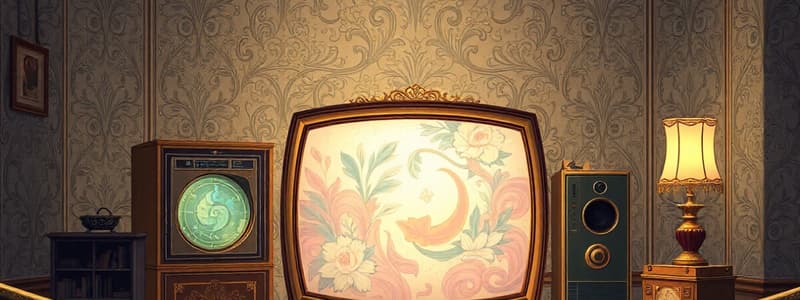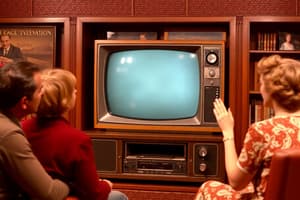Podcast
Questions and Answers
How did the introduction of television impact political campaigns during the Golden Age of Television?
How did the introduction of television impact political campaigns during the Golden Age of Television?
Candidates began using TV ads to reach voters.
What is meant by the term mass media in the context of television's influence on American society?
What is meant by the term mass media in the context of television's influence on American society?
TV programs can reach large audiences and have a powerful influence over public opinion.
Besides entertainment, how has television positively contributed to American society?
Besides entertainment, how has television positively contributed to American society?
Television provides educational programming, offering access to information on various topics.
Describe how televised presidential debates influence voters during election seasons.
Describe how televised presidential debates influence voters during election seasons.
What role did networks like CBS, NBC, and ABC play during the Golden Age of Television?
What role did networks like CBS, NBC, and ABC play during the Golden Age of Television?
Flashcards
Philo T. Farnsworth
Philo T. Farnsworth
Invented the first electronic television system using cathode ray tubes.
Golden Age of Television
Golden Age of Television
A period in the 1950s when TV became popular, shaping American culture with shows like 'I Love Lucy'.
Dominant TV Networks (1950s)
Dominant TV Networks (1950s)
Networks like CBS, NBC, and ABC that dominated television broadcasting during the Golden Age.
Mass Media (Television)
Mass Media (Television)
Signup and view all the flashcards
TV's Impact on Political Debates
TV's Impact on Political Debates
Signup and view all the flashcards
Study Notes
- Television's history in America started in the early 1900s with experimental broadcasts.
- Philo T. Farnsworth invented the first electronic television system in 1928, using cathode ray tubes.
- Television became widespread in American homes in the late 1940s.
Golden Age of Television
- The 1950s marked the Golden Age of Television, with CBS, NBC, and ABC dominating.
- Popular shows included "I Love Lucy," "Leave It to Beaver," and "The Tonight Show."
- These shows influenced American culture and social norms.
- Television became important in political campaigns through TV ads.
- Barack Obama successfully used social media in his 2008 and 2012 campaigns.
- Television has significantly shaped American culture, politics, and social interactions.
- It has influenced American views on race relations, gender roles, and sexuality.
- Television's ability to create mass media has a powerful influence on public opinion.
- Presidential debates are broadcast live, allowing millions to form opinions about candidates.
- Television provides educational programs on diverse topics like history and science.
- While contributing to cultural homogenization, television allows for diverse voices.
Impact on American Politics
- Television has profoundly impacted American politics.
- Presidential debates are integral to the political process, enabling voters to see candidates in action.
- The first televised debate was between Dwight D. Eisenhower and Adlai Stevenson in 1952, with over 60 million viewers.
- Television was used for propaganda during the Cold War, promoting anti-communist sentiments.
- Political campaigns use TV ads to sway public opinion.
- TV shapes public opinion through news programs and talk shows.
- Politicians must craft messages that resonate with the audience.
- Television influences public opinion on social issues such as race relations, gender roles, and LGBT rights.
Shaping Public Opinion
- TV influences how people understand political events and issues.
- It reaches large audiences quickly, making it a tool for persuasion, especially in election campaigns.
- News programs often set the agenda for public discourse.
- Television shapes cultural norms and values through sitcoms and reality TV.
- Reality TV shows expose viewers to different lifestyles and belief systems.
- Reality TV's influence on public opinion is complex but important in shaping American views on politics and society.
Television as a Source of News and Information
- The first television broadcast was on July 13, 1928, by John Logie Baird in Scotland.
- Regular TV broadcasts in the U.S. began in 1947 with NBC's "Mary Kay and Johnny."
- Television provides breaking news, sports updates, weather, entertainment, and political coverage.
- Local news stations help people stay informed.
- Concerns exist about the accuracy and sensationalism of TV news.
- Viewers may struggle to distinguish between fact and fiction on news programming.
Portrayal of Minorities
- Minorities have historically been underrepresented or stereotyped on television.
- This perpetuates negative stereotypes and reinforces power structures.
- Efforts have increased minority representation with shows like "Black-ish" and "Fresh Off the Boat".
- Progress is slow, and many minority groups remain underrepresented.
- There is a lack of diverse writers and producers behind the scenes.
- Accurate and nuanced representation requires diverse voices.
Impact of Violence on Children
- Exposure to violent media can lead to desensitization, aggression, and decreased empathy in children.
- Young viewers are especially vulnerable.
- TV violence may reinforce gender stereotypes and promote anti-social behaviors.
- Violence on TV has been linked to increased fear and anxiety in children.
- Parents and policymakers should limit children's exposure to violent programs.
Impact of Advertising
- Advertisers pay for airtime to promote products.
- TV networks tailor programming to appeal to advertisers.
- Programs schedule around commercials, and sitcoms are favored for higher ratings.
- Advertisers pressure networks to include product placements.
- Product placement is a major revenue source for TV networks, allowing continued production.
Reality TV's Impact on American Culture
- Reality TV influences popular culture.
- Phrases and concepts from reality TV have become part of everyday language.
- Many reality TV stars have achieved mainstream fame.
- The confrontational nature of reality TV has been compared to modern politics.
- Critics argue that reality TV contributes to polarization and incivility in political debates.
The Future of Television
- Increased streaming services are shaping the TV industry.
- More personalized viewing experiences and original programming are expected.
- Streaming services like Netflix, Hulu, and Amazon Prime Video allow on-demand viewing.
- Personalized viewing experiences use algorithms to recommend content.
- There's an increasing focus on original programming to stand out from competitors.
- High-quality dramas, comedies, and reality shows are being produced by major studios and networks.
Studying That Suits You
Use AI to generate personalized quizzes and flashcards to suit your learning preferences.





